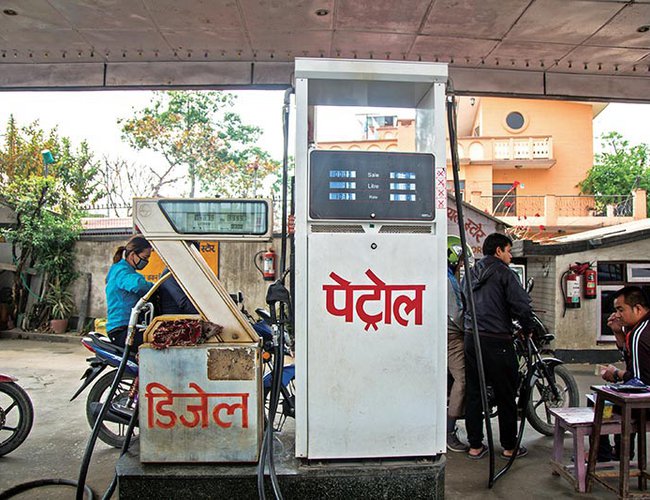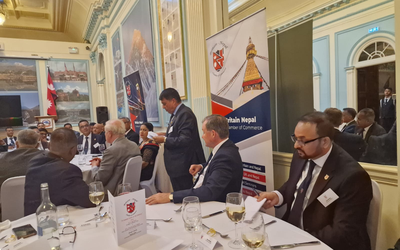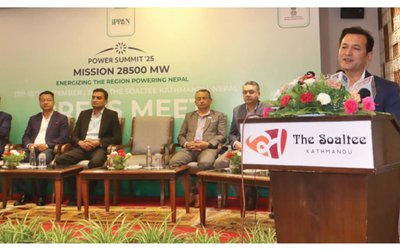
"What have you earned in life man, how many diamonds, how many pearls ! But remember man, there are no pockets in the shroud. "
It is not known who composed the above verse, where and when. We don't even know what impulses and anxieties he created, but we have all heard the message given to human society to be free from greed and sin by reciting the above two lines in a gathering of devout people. It is said that the famous German atheist Friedrich Nietzsche would have been influenced by the above two lines and believed in God if he were alive today, but the oil-producing nations that are affiliated with the Organization of Petroleum Exporting Countries (OPEC) are making turn over significantly. Even though these oil producing nations have so much income, their minds and stomachs are not full.
Even today, OPEC is gradually raising oil prices. But it is true that the rise in oil prices in Nepal is not due to this, but rather to the withdrawal of subsidies, the abolition of cross-subsidies and the adjustment of prices through direct trade calculations.
The Consumer Protection Law is an important aspect of the Competition Law. Consumer protection is a very important issue in competition law. Even if it is a competition law or a consumer protection law, it should provide consumers with a simple and easy supply of reliable, cheap and quality goods in terms of price, quality and service.
The fact that Nepal's private sector has never been accused of mobilizing its energy and the tendency to look at each other in every work has not been able to hide the fact that it has become the identity of the private sector. It is seen that the corporation has made this arrangement as per the decision of activating the role of private sector in the price of petroleum products.
In most of the countries, the price of petroleum products has been kept politically and after every increase in the price of petroleum products, there will be protests, street demonstrations, strikes, bandhs and such protests will not be allowed to increase the price of petroleum products. It would not be an exaggeration to say that this has proved to be a milestone in the chain of inflation as it has been deregulated by inflation over the past few years .
Although the government's job is not to trade and it is not its obligation to sell to India at a cheap price. The government could have brought the price at 'at par' by deducting revenue equal to customs, but it did not do so. The government has not been able to realize its social responsibility towards the people.
In some countries, the national oil company has been given a monopoly and the import cost is non-existent, with subsidies and cross-subsidies. In view of this, it was felt that the role of the government in the petroleum sector should be redefined and the market should be deregulated, even if the Nepal Oil Corporation was running at a loss and could not get loans from various banks. But the environment does not seem to be conducive to trusting only the private sector in sensitive commodities such as petroleum products. Therefore, on the one hand, there is a need for corporations within government regulation, on the other hand, the private sector should be able to move forward with participation, no one should have a complete monopoly, but the private sector should be allowed to enter the petroleum business and be competitive and be guided by law.
In this context, the market for petroleum products is so sensitive that fluctuations in international market prices may not take long to make a profit or a loss of tens of millions.
Nepali private sector entrepreneurs are not in a position to take this risk. Due to the lack of oil, the pace of the country will stabilize. Therefore, when the private sector is involved in sensitive issues, the private sector may act dynamically only at the right time, but in adverse conditions, the exact opposite can happen.
Therefore, when the private sector has to be involved in the petroleum business, the corporation and the private sector should be given equal opportunity and the corporation can compete only if it has the storage capacity it needs, the physical infrastructure it needs to be regional and a reliable basis for investment.
Against this backdrop, the sector needs to be deregulated in view of rising oil prices and high oil sensitivities, and the petroleum distribution market needs to be kept open to the private sector and monitored by independent bodies. The government's job is simply to play the role of facilitator by formulating appropriate policies and for the independent regulatory body to focus on prices, quality services and other consumer interests. However, in the current unfavorable situation in the country due to Covid, the poor people are being beaten from all sides.
Today, most of the world's oil companies have undergone structural changes, consolidating and privatizing national oil companies. In this regard, the government is confusedThe national oil company is being integrated and privatized. In this regard, the government should take serious policy decisions as soon as possible with regard to petroleum products.
It has been doing business by purchasing fuel from the Oil Corporation of India (IOC). The IOC sends new price lists to the corporation on the 1st and 16th of the English month based on international price fluctuations. On the basis of the same price, the corporation fixes the new price and fixes the retail price in the case of the consumer.
It has adopted automatic pricing method or modality to adjust the international market price. In the second phase, the oil corporation should be privatized, in the third phase, the depots of the oil corporation should be privatized as commercial establishments, in the fourth phase, the shares of the oil company should be sold, in the fourth phase, complete deregulation or independence.
With the receipt of the new price list from the Indian Oil Corporation (IOC), the loss of the Nepal Oil Corporation is expected to increase further. Based on the price list received from the IOC on October 1, the corporation has projected a loss of more than Rs 1.5 billion from fuel sales in 15 days. Adding the new price sent by IOC and taxes and other costs incurred in Nepal, the corporation gets Rs 139.18 per liter for petrol, Rs 120.01 for diesel, Rs 93.94 for kerosene, Rs 84.07 for domestic aviation fuel and Rs 84.07 for aviation fuel for external flights. It costs Rs 76.44 and cooking LP gas costs Rs 1,961.88 per cylinder.
In a cursory review, the corporation had last adjusted the price of petroleum products on September 25. Accordingly, the price of petrol has been fixed at Rs 130 per liter, diesel and kerosene at Rs 113 per liter, domestic aviation fuel at Rs 86 per liter and cooking gas at Rs 1,450 per cylinder. Based on the mentioned prices, the corporation is currently losing Rs 9.18 per liter on petrol, Rs 7.01 on diesel, Rs 19.59 on kerosene, Rs 1.93 on domestic aviation fuel, Rs 15.10 on external aviation fuel and 511 per cylinder on cooking gas.
Due to the relatively low demand for kerosene and aviation fuel and the high demand for petrol, diesel and cooking gas, the corporation is projected to lose Rs 1.5 billion in just 15 days.
Increasing losses
Prices have started rising again in the international market recently. At present, the price of crude oil in the international market has reached an average of 80dollar per barrel. The rise in crude oil prices in the international market has played a role in increasing the corporation's deficit. When the corporation last adjusted the price on August 25, the international market price had declined. The corporation had increased the price as the cost was not less than the cost price even though the international market price fell. The corporation was criticized at that time saying that the price of Nepali market had gone up even when the price in the international market went down. However, that adjustment reduced the corporation's monthly loss to an average of Rs 840 million. However, the IOC has since doubled the price and sent the price list. The prices of all types of fuel have gone up based on the price list sent on September 1 and October 1. The highest price increase has been in diesel. The price of diesel has gone up by Rs 7.14 per liter, aviation fuel by Rs 6.97 per liter, petrol by Rs 4.09 per liter and kerosene by Rs 3.56 per liter. The price of LP gas has increased by Rs 15.69 per cylinder, according to the corporation.
According to the RSS, the price list received on September 16 was higher than the price on September 1. Based on that price, the corporation had projected a loss of Rs 1.5 billion in 15 days. However, the corporation did not adjust the price at that time. Now, based on the increased price, the loss of the corporation has increased .
The financial condition of the corporation is deteriorating due to continuous losses. International prices and domestic taxes and costs are pushing up the corporation's cost price, but the loss is increasing when fuel has to be sold at a price lower than the cost price.
Consumers in Nepal are forced to pay exorbitant prices due to the tax burden on petroleum products. The government has been collecting revenue under various headings on the basis of fuel prices. However, whether the revenue raised in this way has been properly utilized or not will be a matter of discussion.
Here are 10 tips and tricks to avoid price hikes: As diesel prices rise, so does the overall transportation fare, and so do the costs and prices of all sectors. Gas is connected to the kitchen of every household, it affects the kitchen of the poor, why not find an alternative way to increase the price? After the increase in consumption, the management cost per liter has to be reduced. What does the Oil Corporation do? What is the function of the Price Stabilization Fund? Why not use it? Shouldn't the tax levied by the government be reduced in such a short time? Why charge more than the cost price? Infrastructure tax is removed now, that money has not been used in the international market Translation types
Due to the increase in the price in the international market, the price of the country's oil has been adjusted automatically and in recent times, the Oil Corporation has not had to bear the financial loss. In the past, Nepal Oil Corporation was a monopoly organization for the sale and distribution of petroleum products by the government. This sector, which is making a significant contribution to the national economy, seems to be generating significant revenue annually. Instead of gradually increasing the price of petroleum products, the Government of Nepal could have reduced total consumption by adopting various energy saving or alternative measures. For example, in singapore, reduction of tax rate if 4 people use the same vehicle or full use of the vehicle, emphasis on maximum use of the vehicle instead of going to the same destination empty vehicle and adoption of security system etc.
Even if the development and safety of lifting culture in Nepal was guaranteed, the total consumption could have been reduced to some extent. Although it is difficult because of Covid-19. Rising oil prices in the Indian market, Nepal- India is an open border, so it is not uncommon for oil to be exported to India, no matter how effective the monitoring is for controlling theft.
At the same time, it is necessary to pay equal attention to the distribution of quality petrol in Nepal as it is widespread among the businessmen involved in this business who want to get rich quick by mixing cheap petroleum products with high priced petroleum products.
- Susan's “U-Turn” From Atheism To Spirituality And Superstition: Some Considerations
- Jun 29, 2025
- Former Ambassador To People’s Republic Of China Acharya's 'Diplomatic Diary': A Collection Of "Autobiography " Including Diplomacy
- Jun 17, 2025
- Banker And Businessman Being The Same Person: How Practical, How Impractical
- Jun 01, 2025
- 2082/83 Policy And Program: Presentation New, Short But Not Exciting
- May 07, 2025
- Nepal's Capital Market: Some Analysis
- May 02, 2025
















